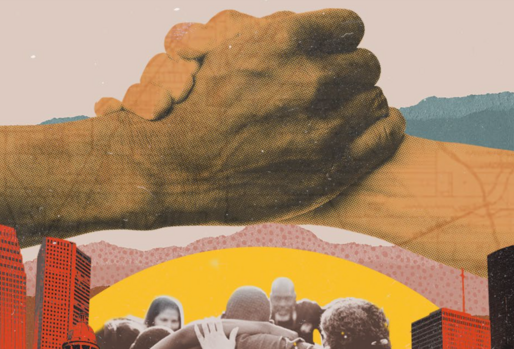
REPORT: Black, Latino Texans Instrumental in Bolstering Disaster Recovery Protocols Following Hurricane Harvey
Demos, Texas Organizing Project Report Shines Light on Grassroots Pursuit of Equitable Relief Allocation in Five Years Since 2017 Storm
NEW YORK—A new report from Demos and the Texas Organizing Project (TOP), a grassroots nonprofit organization, highlights Black and Latino Texans’ fight against racial inequity in the distribution of federal disaster relief funds. In the nearly five years since Hurricane Harvey, organizers have pushed for reforms that improve how federal funds are allocated and ensure historically marginalized populations have a voice in the disaster recovery process.
After the 2017 storm, which caused 68 deaths and $125 billion in damages, Black and Latino residents of Houston were the hardest hit and the least likely to receive Federal Emergency Management Agency assistance. While an average white resident of a higher-income Houston neighborhood received $60,000 in FEMA relief, an average Black resident in a low-income neighborhood received $84.
Community organizers from TOP began door-knocking in Harris County immediately after the storm to support community members with food, water, and financial assistance. In doing this work, the organization identified structural inequities that gave wealthy white men sole authority over decisions that directly affect Black and Latino communities. Prior to the storm, in response to ongoing inequities in representation and power, TOP had launched the Board and Commissions Leadership Institute (BCLI), a training program that prepares low-income women of color to serve on Texas boards and commissions. The first BCLI cohort graduated the same weekend Hurricane Harvey descended on the Gulf Coast in 2017.
“TOP was intentional about serving the people of Texas throughout the aftermath of Harvey,” said Christina Quintero, a TOP member and BCLI alumna who serves on the San Jacinto Regional Flood Board. “That’s where I think engaging in community work starts. BCLI, at its core, is about standing up, speaking up, and empowering neighborhoods that have been ignored the majority of the time.”
In 2018, as part of its multi-pronged plan to increase diversity on Texas boards and commissions, TOP’s get-out-the-vote efforts helped elect Harris County Judge Lina Hidalgo. Hidalgo, who was vocal about the need for equitable disaster relief after Harvey, is the first woman elected to lead the Harris County Commissioners Court, which oversees the county’s budget.
As part of its ongoing organizing efforts—of which BCLI was an integral component—TOP also worked to reform formulas that govern the distribution of federal disaster relief funds. In accordance with the organization’s recommendations, Harris County adopted a new framework that takes into account factors related to a community’s ability to prepare for, respond to, and recover from a disaster, like the percentage of residents who are elderly, have limited English proficiency, and live in households without a vehicle. Texas recently has employed this framework to ensure equitable distribution of CARES Act and American Rescue Plan funds.
“In less than five years, TOP has played a major role in reforming the local approach to disaster recovery in Texas,” said Lebaron Sims, Associate Director of Policy and Research at Demos. “In the midst of their own individual trauma and efforts to recover, this organization’s members have built a pipeline for a more diverse pool of future elected officials and created a more equitable framework for the distribution of relief funds. TOP’s success reflects what’s possible when people of color organize around what matters most to them and advocate for a seat at the table.”
This case study is the second of four Demos reports on economic democracy. The series highlights the ways in which Black and brown people in America can — and should — have greater control over the institutions and economic forces that shape their lives.
###
Demos is a think tank that powers the movement for a just, inclusive, multiracial democracy. Through cutting-edge policy research, inspiring litigation, and deep relationships with grassroots organizations, Demos champions solutions that will create a democracy and economy rooted in racial equity.
Texas Organizing Project organizes Black and Latino communities in Dallas, Harris, Bexar, and Fort Bend counties with the goal of transforming Texas into a state where working people of color have the power and representation they deserve. For more information, visit organizetexas.org.

